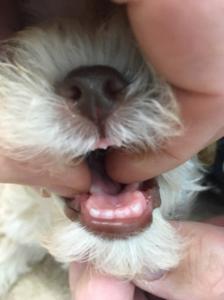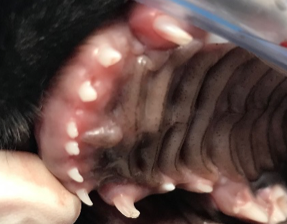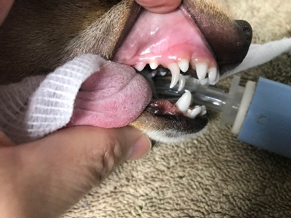Puppy baby teeth, whatever could go wrong?
When our puppies (and kittens) are born, they are toothless, just like human babies.
Baby teeth, also known as deciduous teeth or primary teeth, in our puppies erupt from about 3 to 6 weeks of age. The permanent or adult teeth come through from about three months of age to about six months of age. As the permanent teeth develop in the jawbone, they absorb the roots of the baby teeth, so the baby teeth become wobbly and fall out. Or at least this happens if all goes according to plan.
6 Puppy Tooth Problems
As pet owners and primary care vets, it is essential to keep a close eye on the development of the baby and permanent teeth and their position in the mouth. Things can go wrong with this process, and at times, this can lead to lifelong painful conditions for a pup.
Some problems that can occur with baby teeth include:
Delayed eruption of a deciduous tooth
Where the overlying gum is so fibrous that the baby tooth can’t push through. This requires dental radiography to confirm, followed by surgery to help the tooth erupt when the pup is still young enough.


An unformed permanent tooth
Which then may cause the baby tooth to remain in place as it doesn’t get “pushed out” by the permanent tooth. This tooth may remain functional unless resorption of its root takes place and the tooth may then need to be removed.
Fractures of baby teeth
Puppies (and kittens) like to chew a lot, and if they choose to chew hard non-tooth friendly objects, they can sometimes crack or break off parts of their baby teeth. Baby teeth are not as strong as the permanent teeth and more prone to fracturing. If this occurs, the live pulp is exposed and will become infected and die off, risking damage to the permanent tooth bud underneath it. Fractured baby teeth need to be surgically removed as soon as possible!


Retained (persistent) baby teeth
This usually happens to the upper (maxillary) or lower (mandibular) canine teeth (fangs), but can also happen to incisors or premolars. Problems can occur because the permanent tooth grows in the wrong position. This can lead to painful problems, especially if the permanent tooth hits another tooth or digs into the hard palate, causing permanent pain and damage.


Jaw misalignment
There are several types of malocclusions or misalignments recognised, some of them even part of breed expectations, for example, bulldogs with underbites. One particular misalignment, which can cause a lifelong painful mouth and complications such as abscesses or fistulas through to the nasal cavity is “base narrow canines”.
Base narrow canines (or linguoverted canines)
Can occur when the mandibular canine teeth either erupt too vertically, or the lower jaw is too short, and the lower canines point towards the hard palate and end up piercing the hard palate every time they close their mouths. Or if the baby mandibular canines persist, forcing the adult canines to grow on the inside of the baby canines and then strike the hard palate that way.
These puppies are usually head shy (so sometimes sedation is needed to diagnose the problem) and love to chew on things or carry things in their mouths (so the jaws don’t completely shut, driving the lower canines into the upper palate.
At Cronulla Vet Clinic, we make sure to give your pup a thorough examination, including a mouth, check each time they come in for their vaccinations or check-ups.
If problems are diagnosed early enough, we can address them early, preventing lots of pain and damage, physical as well as emotional. In some cases, this will require surgical intervention or even a referral to a Veterinary Dentist.
If you have any concerns or questions about puppies and their baby teeth, please don’t hesitate to contact our friendly team at Cronulla Vet Clinic. 😊
